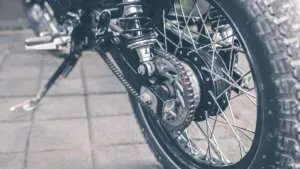Contents
A lot of you know about the article we wrote back in March on cleaning your motorcycle chains. It was a step-by-step guide. We explained a lot of things- the different types of chains, how to decide on whether you needed to replace your chain, and the different ways you could clean your chain- in addition to information on motorcycle cleaning kits.
But we wrote this article to help those of you who can’t, for some reason or the other, get to a dedicated motorcycle cleaning kit. Budget, accessibility, convenience, the pandemic- what have you.
Now, we always suggest a dedicated chain cleaning kit- especially if you’re just flying by the seat of your pants and haven’t done the research. Because, well, they’re in the name. Dedicated.
But you don’t have to fly by the seat of your pants. Because out of the millions of articles on this topic for you to start doing your research in, this is about as perfect a place you can begin.
Because in this article, we’re going to run you through different materials that people use to clean their motorcycle chains. The ones that you shouldn’t, and more importantly, should use. Keep reading.
Is it really necessary to clean my chain?

In a nutshell- yes.
In a slightly bigger nutshell, you should clean your chain for the following reasons:
- Improves riding smoothness
- Increases your motorcycle’s mechanical power delivery
- Your bike’s fuel economy will dip less over time
- You get a lot more miles out of your chain before having to replace it
- Chain maintenance isn’t that hard
*Before you read the rest of the article: keep in mind that when we say “clean your chain”, we don’t mean just the literal cleaning of your chain. Chain maintenance includes cleaning, lubrication, degreasing, and finishing- the products listed in this article are a reflection of that.
(For example- cleaning gets the grime and particles out of your chain, lubing increases the smoothness between the rollers, sprocket and link joint in your chain et al.)
Can you clean a motorcycle chain with WD40?
What WD-40 Is
Founded by the Rocket Chemical Company (later renamed to the WD-40 Company) in San Diego back in 1953, the WD-40 has now become a household name in the world of sprays. The WD stands for “Water Displacement” in short.
While it’s composition is still a trade secret, the USMDS lists the following ingredients in its aerosol cans:
U.S Formulation
- 45-50 % low vapor pressure isoparaffin
- <35% petroleum base oil
- <25% flammable aliphatic hydrocarbons
- 2-3% carbon dioxide
EU Formulation
- 60-80% hydrocarbons
- 1-5% carbon dioxide
Australian Formulation
- 50-60% Naphtha
- <25% Petroleum Base Oils
- <10% Naphtha, hydrodesulfurized heavy
- 2-4% Carbon Dioxide
Is it suitable for chains?
Verdict: Unfortunately- no.
As mentioned above, the WD stands for Water Displacement. It’s designed to disperse water away from metal parts to prevent rust- not to be a lubricant. In fact, using it on your motorcycle chain can reduce the life of your chain in comparison with using lubricants designed specifically for motorcycles.
Reason being some motorcycle chains that are built with a tiny rubber ring placed between the plate and the bushings. They are already manufactured pre-lubricated- the seals are designed to keep the lubricant in place.
When you use materials like WD-40, this can deteriorate the seals. Eventually causing the original lubrication, which was designed to be permanent, to leak out. As a result, the life of your chain is reduced.
Can you clean a motorcycle chain with soap and water?

Verdict: It’s a mixed bag. You can make do with soap and water as a temporary solution, but we wouldn’t recommend you do it long-term.
And that’s because motorcycle chain maintenance generally follows the following pattern:
- Degreasing
- Cleaning
- Lubing
- Finishing
(Which is why in the article we linked in the beginning, the first step said “scrubbing”.)
As you can tell from the pattern above, soap and water is fine. It’s not going to damage your chain, but the longer you do it, the more diminishing the returns.
If your chain is particularly grimy and nasty, a good wash down will help. But make sure that the links between your chain are dried. You don’t want to risk your chain rusting.
(P.S. this is where the WD-40 helps).
That being said, soapy water can be a great supplementary part of your cleaning routine. Including soapy water in your routine after you degrease and before you lube is very effective.
Can you clean a motorcycle chain with brake cleaner?

Verdict: No. Brake cleaners are strong solvents, that, like many strong solvents, end up deteriorating lubrication.
The main application of brake cleaners is the degreasing and cleaning of metal parts/ surfaces. In the industry, (mainly in the automotive sector) they’re used for removing oils, fats, resins, tar and dust.
Unfortunately, they’re not very good at chain maintenance.
There are two kinds of brake cleaners:
- Chlorinated brake cleaners, such as those containing organochlorines like tetrachloroethylene
- Non-chlorinated brake cleaners (the ones that use hydrocarbons as a main component)- the hydrocarbons used are sometimes made by hydrogenation from naphtha.
And as you can guess after reading the section on WD-40, harsh solvents such as brake cleaners tend to penetrate your o/x rings and break down the pre-sealed lubrication. The can also result in increased friction and wear in your chains.
Can you clean a motorcycle chain with paraffin?
Verdict: Hell yes.
Paraffin is fantastic at repelling things that should be repelled. The difference in the debris your motorcycle chain collects over the course is going to be night and day.
Paraffin wax, first created by Carl Reichenbach in Germany in 1830, is a soft solid that is usually derived from petroleum (also known as Kerosene). Solid at room temperature, it begins to melt at temperatures above 99 °F.
It’s important that we mention the melting part. This is because when cleaning your chain with paraffin wax setups, you’re going to be using paraffin oil, and a crock pot (yes, a crock pot) to melt the paraffin in. Following which you’ll be dipping your chain in the mixture.
What makes paraffin wax setups special?
One thing that annoys the living heck out of most people when cleaning chains is the black grease stains that get on everything. They can really be a bummer. Especially if you forget to change into “garage work” clothes and your nice pants end up being, well, not nice.
But a properly paraffin waxed chain leaves no black chain residue. You read that right.
Just get a $10 hot plate and a crockpot. The heating process is ridiculously easy and straightforward (and quick).
The only downside is the relatively short lifespan of wax.
Can you clean a motorcycle chain with petrol?

Verdict: Hell no.
Petrol is expensive, eats through latex gloves, can ruin a lot of plastics, and dries fast.
Also, you probably don’t want to be anywhere near a gas station with a petrol-jellied motorcycle chain (and we’re only half joking).
And given the price of gas nowadays, using petrol to clean your chain wouldn’t be very smart.
Like some of the other items on this list, petrol also runs a risk of destroying the o-rings in the chain, severely shortening the life of the chain.
Furthermore, using petrol can also make it very difficult to get lube back into the places the petrol had already seeped into. When you count in the fact that petrol doesn’t just get lube out of the chain surfaces, but also gets it out of the microscopic pores of the metal- the result is a chain that is probably going to run dry quickly.
It’s also going to be attached to a large metal box that heats up in the sun. We’re not saying your bike will run a risk of erupting into flames everytime you ride, but it’s not exactly risk-free. You know, since you’re using a highly volatile substance- gasoline- to do your cleaning.
Can you clean a motorcycle chain with kerosene?
Verdict: Yes.
It’s safe to use kerosene on sealed chains. In fact, the primary ingredient in most chain cleaners is kerosene.
Fun fact: Paraffin wax, which we were raving about just a couple sections earlier, is extracted from kerosene. That alone should tell you about how safe it is.
While paraffin wax set ups do a thorough cleaning of your chain, kerosene is usually dispensed through aerosol cans.
Keep in mind that kerosene is very similar to petrol. The same petrol that we said was horrible for chain maintenance a couple sections above. Where kerosene is different is that it’s a petroleum product miscible with many industrial liquids. Hence kerosene can be used as both a solvent, able to remove other petroleum products, such as chain grease, and as a lubricant, with less risk of combustion when compared to using petrol.
Which is why kerosene does a great job as a cleaner- it dissolves oily dirt.
The only downside with kerosene is that it can remove your lubricants. So while this makes your chain nice and clean, it can also make it wear faster since you’ve flushed out all the lube. So make sure you add plenty of lube after cleaning.
Can you clean a motorcycle chain with diesel?
Verdict: Yes.
Some of you are probably surprised at our verdict on diesel, given what it was on petrol. Because they’re almost the same thing, right?
Not quite. For starters, diesel is a specific fractional distillation of petroleum fuel oil. It’s way less readily burnable than petrol is.
Diesel, while good at absorbing tiny particles, doesn’t do it to the degree that petrol does (which penetrates the sealed-in lube and o/x). This is also why a lot of you who’ve stopped your bike by service centers can see employees wiping the chain with a cloth soaked in diesel (usually right after they wipe it with a wet cloth).
Also, when compared to kerosene, diesel dries your chain less. This is because it evaporates a little slower than kerosene and leaves more residue behind, which protects the metal. You don’t have to apply lube as soon.
Conclusion

Chain maintenance is imperative to the smooth functioning of any motorcycle. A chain that is properly cared for results in increased riding smoothness, a boost in your motorcycle’s mechanical power delivery, greater fuel economy and a lot more miles out of your chain before you have to make a trip to the store.
Which is why it’s your responsibility to make sure that you’re aware of what goes on your chain, and how it affects your chain. Which we hope that making it till the end of this article aided you with.



 Is Your Motorcycle Battery Dead? 8 Symptoms to Look For
Is Your Motorcycle Battery Dead? 8 Symptoms to Look For  Complete Guide To The Best Long Distance Motorcycle Riding Gear
Complete Guide To The Best Long Distance Motorcycle Riding Gear  How To Clean A Motorcycle Chain | Best Kits Of 2020
How To Clean A Motorcycle Chain | Best Kits Of 2020  Sticky And Stinky: How To Clean Motorcycle Helmets
Sticky And Stinky: How To Clean Motorcycle Helmets 